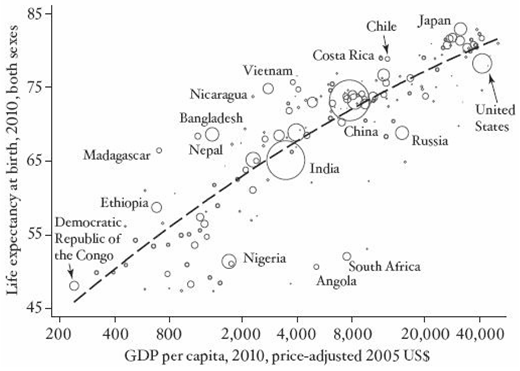The Great Escape: Health, Wealth, and the Origins of Inequality
by Angus Deaton, Princeton University Press 2013/9
Angus Deaton教授の経済発展論。ピケティ本より薄いですけど、様々なデータを読むだけで勉強になりました。所得の上位1%が、所得の2割を占める(第5章 Figure 4) とか、ピケティのような話題もありますが、著者が議論するのは、”Wealth and health”.
The aim of the book is to provide an account of wealth and health around the world, focusing on today but also looking back to see how we got to where we are. p.12
映画と同じタイトルの意味は、
THE GREATEST ESCAPE in human history is the escape from poverty and death. p.23
ちょっとした一文が、重いですね。象徴的なのが、Figure 2.

(資料は本書。以下同じ)
コンゴの一人あたりGDPって500USDぐらいだっけ?とか。ナイジェリア、アンゴラ、南アフリカは、資源でGDPが嵩上げされていても、平均余命55歳以下とかいろいろ考えさせられます。
平均余命は、戦後世界的に改善しているのがわかるのは、Figure 3.

中国の影響の大きさを実感できます。
One of the worst in human history was China’s “Great Leap Forward” in 1958-61., when deeply misguided ndustrializatinand food procurement policies lead to the deaths of aroud thiry-five million people from starvation and prevented the births of perhapsforty million more. p.38
Figure 6 は、貧困率の推移。1980年には15億人いたのに2008年では10億人を切っています。大脱出は、中国のことでした。
The rapid growth of China and India has not only enabled hundreds of millions of the world’s citizens to make the Great Escape but made the world more equal place. p.44
第3章のFigure 1に地域別の寿命のグラフがあるのですが、1950年ごろの東アジアの平均寿命は40台。私は、すでに死んでいる年齢なんですね。中国の飢饉が大きく数字に影響しています。
第1章に戻って、Figure 7は幸福度の図。一人あたりGDPが3千ドルまでは、所得増に応じて幸せと感じるが、その後、2万ドルぐらいまでは横ばい。3万ドルあたりから上昇しているのが興味深い所です。イラク、ロシア、ウクライナといった国は幸福度が中心値から下放れしてますね。
結論としては、意外なことに、
Income and health have improved almost everywhere since World War II. p.56
テレビでシリア難民の映像見過ぎなのかもしれませんが、たしかにデータではそう見えます。
第1部は、Life and death。第2章はアメリカを取り上げており、貧富の問題が、単純な南北問題でないことが描かれています。印象的なのは、5章の Figure 2。貧困率は、65歳以上では下がっているのに、18歳未満や、黒人は横ばい、というか、2000年代は上昇しています。
第3部は、Help。第7章 How to Help Those Left Behind。先進国からの支援は、”aid illusion” と述べています。
One of the stunning facts about global poverty is how little it would take to fix it,at leaset if we could magically transfer money into the bank accounts of the world’s poor. p.268
原因は、先進国側が、二国間の援助を好み、条件を付けることや、
Aid, including both offical aid an humanitarian aid from NGOs, s often given to regines that have littel interest in or track record of helping their own populations. p.279
という厳しい評価。では我々は何をすべきかという点についても、
Yet this may be precisely the wrong question, and asking it may be part of the problem, not the beginnings of a solution. p.312
とバッサリ。
あとがきは、What Comes Next? 温暖化、紛争、識字率まで出てきて、私には消化しきれませんでした。しかし、久々に途上国経済について興味を持つ機会をもらいましたので、引き続き関心を持って行きたいと思っております。
では。


